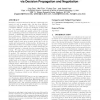805 search results - page 13 / 161 » Solving Consensus Using Structural Failure Models |
142
click to vote
BMCBI
2008
15 years 2 months ago
2008
Background: Inferring cluster structure in microarray datasets is a fundamental task for the so-called -omic sciences. It is also a fundamental question in Statistics, Data Analys...
142
click to vote
KDD
2009
ACM
16 years 2 months ago
2009
ACM
Nowadays, enormous amounts of data are continuously generated not only in massive scale, but also from different, sometimes conflicting, views. Therefore, it is important to conso...
103
click to vote
ISSRE
2003
IEEE
15 years 7 months ago
2003
IEEE
Prior research has suggested that the failure rates of faults follow a log normal distribution. We propose a specific model where distributions close to a log normal arise natural...
117
click to vote
STOC
2002
ACM
16 years 2 months ago
2002
ACM
A randomized algorithm is given that solves the wait-free consensus problem for a shared-memory model with infinitely many processes. The algorithm is based on a weak shared coin ...
106
click to vote
STOC
1997
ACM
15 years 6 months ago
1997
ACM
We examine a class of collective coin- ipping games that arises from randomized distributed algorithms with halting failures. In these games, a sequence of local coin ips is gener...

